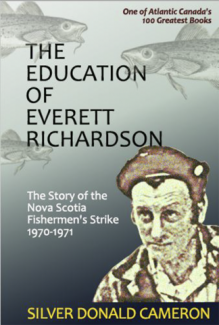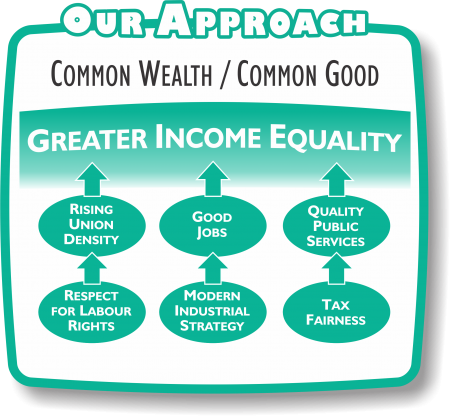NO SURRENDER
Book reissue: How 235 fishermen won our hearts and minds in 1970 strike

ALL HE GOT WAS $2.01. Everett Richardson had worked 10 days to get it. Ten days on on a deepsea dragger on the North Atlantic off Nova Scotia, on the open deck, in February, 10 days—and that was all he got!
Everett remembered: “We sailed January 27 and we landed February 4 and we made $2.01 apiece. And the one cent was in the envelope, too, just with the two dollars.”
It was a shitty deal. But that’s all a fisherman could expect in 1959. It wasn’t any better in 1970. That’s why the 235 fishermen in three villages along the strait of Canso, NS wanted a union. That’s why they went on strike for seven months to get it. That’s why Silver Donald Cameron wrote The Education of Everett Richardson about that strike.
Cameron had to tell their story then; and it’s why he decided to re-issue his book now, 42 years later: because it tells a story we need to tell again and again, a story of how we can, and do, rise up to stand together to fight for what we all know is simply right.
“In the end,” Cameron writes, “this is not a story of the fishermen, or even of the labour movement. It is a story about privilege and poverty and injustice in this country, and about the social and political arrangements which cheat and oppress most Canadians, which stunt our humanity and distort our environment.
It is a story we need to remember and to believe: we need to remember all the times that regular, everyday folks like us have dared to do the right thing regardless; and we need to believe we can do it again and again.
Donald Cameron’s book still gets us there.
Interview
What follows is taken from an interview CLI contributor Skip Hambling had with Silver Donald Cameron in early December.
SH: I read The Education of Everett Richardson when it first came out 42 years ago. It stuck with me ever since. It’s still on my shelf. There’s one story in the book that sticks with me the most, it’s the story of the $2 payday.
SDC: Two dollars and one cent, actually, and Everett said the one cent was in his pay envelope too, along with the two dollars. I’m conscious of that one at this moment because I actually read that part of the book out last night at an event in Petit de Grat. I’ve lived close to Petit de Grat since I came down to do this story in 1971.
When I came here I was struck by the fact that there were almost third world conditions in some of these fishing villages. I remember sitting around a table one time and somebody saying to the person who was serving us tea, are you going to the dance tonight? These were people in their early 30s, and she said, “Now how the hell can I go to the dance? I got no fuckin’ teeth.” And the other five that were sitting around at the table all said, “Use mine,” and pulled out their own false teeth. There wasn’t one person at that table that had their own teeth.
That’s the context for this book. The situation was almost third-world. Again, I looked at the conditions on the draggers and these guys casually said, “You work your normal 16 hour days.” Normal! A 16 hour day!
But it was eight hours on and four off, and you’re out there for 12 days at a time in the middle of the Atlantic. It’s mid-winter, it’s cold, people get frostbite and so on. You don’t come in. Even if it’s blowing a hurricane, you don’t come in. You just heave to.
And guys are grateful for that job. Everett at one point worked 62 hours straight, just with breaks for the washroom and to get a little cup of coffee or something. But—62 hours straight! And of course you’re not eligible to have a union because you’re not considered an employee, you’re considered a co-adventurer, a partner, in the fishing voyage.
Some partnership. A multi-national corporation based out of Chicago or England on the one side, and Everett Richardson on the other side.
It’s the details in the story that hit me so hard. Like when I first read it, $2.01 for 10 days work, I thought it was a mistake. It must be a printing error, it can’t be right. Like it can’t happen.
Yeah, absolutely. When I submitted an article on the strike to Maclean’s magazine, Peter Newman, who was the editor then, said “This can’t possibly be.’
I said, “The draggermen earn between $3.500 and $5,000 a year for 5,000 hours of work annually; they work three times as many hours as the average industrial worker.” And Peter said, “This can’t possibly be true, that’s less than the minimum wage.
So I said, “That’s actually the point: they aren’t even entitled to a minimum wage because they are not employees.” That was the nub of the whole matter. The strike was to establish that in fact, the fishermen really were employees and that they should be entitled to a union, to the normal protections that employees get. You don’t get that protection under this co-adventurer scheme.
There is for me a great nobility to the story you tell about these fishermen and their wives. Their simple refusal to be stepped on. Were you thinking about that as you wrote?
Oh, for sure. I was so impressed with the dignity and strength of these people.
Were you conscious of recording a way of life that was already beginning to to fade?
I think I would have been delighted to feel that it was beginning to fade. [LAUGH]
I didn’t so much think of that. What I did think was, “This is an unbelievable case of exploitation, and this is a magnificent attempt to put an end to it.” The courage of these 235 guys and their families—I mean, it was their wives and their children down on the picket lines too. And I thought, this should not be forgotten. That was my fundamental motivation for writing.
It’s been forty-two years since you wrote the book. And now you’ve put your own money into reissuing it. Why, what’s in it for you? What drove you to do that?
The heart of it was, I really wrote the book so that the strike would not be forgotten —but it has been forgotten, to a large extent. And I thought, Okay, bring the book back, and you can start to get that story out again.
The solidarity, the social solidarity, the coming together was very very strong and real in the communities along that coast. Is it still there, do you think?
I do. It’s changed, it’s morphed, it’s 40 years on, so in a lot of ways rural Nova Scotia has been brought into the general mainstream of new development and so on. People here, a lot of them, have been to Fort McMurray and other places, and earned a lot of money. These days, people here take winter vacations down south, which is astonishing to me. It’s a huge change basically in one generation.
But, to remind ourselves of how community works is really the second reason for republishing the book.
For example, it’s still true that when somebody hits hard times here, the community gets together and has what they call, “a day.” They’ll hold a day at the community hall for Donnie Martell or whoever it may be. They start in the morning with a breakfast. They’ll go through the day with games, and there’ll be raffles and there’ll be rummage sales, and a lunch and finally a supper, and then in the evening a dance with a bar. And everything that’s needed to put on that event is contributed, and all the revenue from it is given to the person in need.
Well, that’s a social support network the likes of which you don’t see in very many places. And that’s still very strong and it means a lot. I’ve seen our village, which is only 250 people, raise $15,000 in a day for somebody in need.
So how’s it going? Is your decision to republish working out for you?
I’ve been surprised and actually quite delighted—and my wife has been astounded. She’s been astonished at what legs the book has. But it’s because of people like you that read the book years ago and were impressed by it and remember its significance. I think it’s the memory that this was a really important event, people standing up for themselves and making some real change.
Another big reason I wanted to reissue it is that it’s an inspiring story. It says to people, if you do stand up, and you do get together, and you do take collective action, you can win.
That’s something we always need to remember, now more than ever.
Exactly. Now we have people in the streets, seven million of them, trying to win on a much larger issue, which is climate change and the environment generally. I think it’s important to have these stories available, where people have acted against overwhelming odds and have won. We need that, we need those stories. We need that inspiration.
Absolutely.
I’ve got another book coming out in August. It’s called Blood in the Water. It’s the story of the 2013 killing of Philip Boudreau, in one of those same fishing villages. It was widely covered at the time as a sordid tale of “murder for lobster,” which was an absolutely wrong way of seeing it.
The new book is more a story about individuals, but it also comes out of a whole social context—the same social context, as a matter of fact, with that tight, traditional set of relationships. It’s the relatedness of people who are all family, in a sense, and it comes out of a similar difficulty with the law, actually.
I hope that a fair number of people will read Everett Richardson and then will want to pick up the next one.
But also the other way round, maybe. Maybe you finish Blood in the Water and say, “Wow, I really enjoyed that. I’m really interested in the community that’s being described here. What else has this guy written?” [LAUGH] Right? Well, here’s another book for you to read that’ll give you another experience in this place and with these people.
Silver Donald, thanks very much.
- 30 -













Add new comment